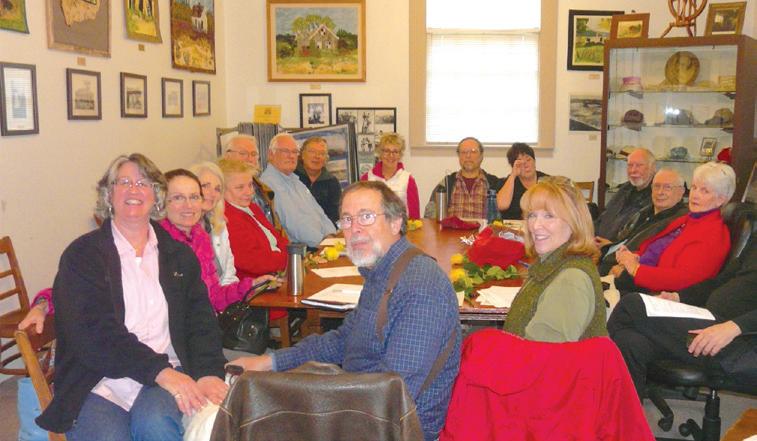
3 minute read
in the Garden
B y r hiannon a llen

Advertisement
Spring is just around the corner. Ah, the joys of growing things and the garden springing to life once again. And then the thought follows that not all living things are welcomed by gardeners, or even others who spend a lot of time outdoors. I’m not writing here about things that damage our plants, such as deer, aphids and slugs. I’m thinking of things that bother me. Things that drive me inside faster than a thunderstorm.
Remember the mosquitos of last summer? Well, I do. I heard residents blame the infestation on standing water left on properties during the pandemic border closures. Actually, that doesn’t make much sense to me, although it is true that standing water is where mosquitos breed.

The reason I am skeptical is that the entire lower mainland was absolutely plagued by mosquitos last summer. The reason? Not long ago, I read Before we lost the lake: A natural and human history of the Sumas Valley. For those new to the area, the Sumas is the flat prairie bounded by the Fraser River on the north, foothills of the Cascades on the south, Abbotsford on the west, and Chilliwack on the east. Now a rich agricultural area, historically it had been a shallow lake. Early accounts detail how mosquitos drove indigenous peoples and European settlers alike absolutely mad in summer. Indigenous communities would retreat upland in summer, but settlers wanted to stay on their homesteads. In the early 1900s, the lake was drained to provide a vast expanse of dry land and to rid the Fraser Valley of mosquitos.
Now, remember 2021, when atmospheric rivers overwhelmed dykes and pump stations, and the Sumas became a lake once more? And then there was a heat dome. Then the following year, more high water and the mosquitos were everywhere. It wasn’t just in Point Roberts, driving gardeners and walkers inside. Everyone was complaining. We had a family picnic in Fort Langley completely ruined. Who knew that mosquito eggs can lay dormant for years, just waiting for an ideal wet summer to hatch? With further suspicions
Margot Griffiths, M.Ed., C.L.C.
After 30 years experience at The University of British Columbia in the Office of Counseling Services, I am pleased to begin my Life Coaching practice in Point Roberts.
appointments arranged by email or text. margot@pointroberts.net 206-604-1713 of the Point Roberts water table rising now with aquifer water no longer pumped and drainage channels not functioning at capacity, we might well be in for nearly yearly repeats of mosquito-infested summers. Sigh … I suppose in some ways it’s just return to pre-20th century natural conditions, but it sure is frustrating.
Other troublesome winged beasts are midges and gnats, those tiny barely visible insects of late spring and early summer that seem to have a talent of flying around your face. They bring back memories of a story we read in school about a camper trying to enjoy his trip despite the flying crowd around him. Since the Point Roberts Garden Club generally begins its garden visits in late spring, itineraries are often sent out reminding gardeners (as if we needed to be reminded) that gnats are particularly active in early evening. “Apply your favorite bug deterrent before joining us,” we warn.
A third pest that is not as widely spread is wasps, those high-strung relatives of bees that will deliver nasty bites and stings if they perceive you to be a threat. I’m lucky that they are not problematic in my garden. However, one property I worked on was so badly infested with an aggressive tribe of non-native paper wasps that we actually had to resort to trying to exterminate them. It became a matter of us vs them in a pitched battle for survival.
Under these onslaughts, faint-hearted gardeners will simply retreat inside and abandon their gardens. That’s what I did last year and the garden suffered visibly. And that was despite the fact that I applied mosquito repellant and wore a repellant-splashed bandana to go outside. I’m sure that helped; it certainly made me the least bothered person on that family picnic. But it was far from 100 percent effective. I spent a lot of time last summer admiring my half-tended garden from the comfort of my house. It was that or borrow a bee keepers’ outfit.
What else can be done? I don’t want to see the return of aerial spraying of insecticides. Anything where we had to be warned to stay inside as the planes flew over is undoubtably bad for most living things and not just those pests.
As a matter of fact, our native pests like mosquitos are not particularly noxious aside from the irritation they elicit in us. Except in severe outbreaks, fungus gnats are even beneficial because they help break down organic matter in our soil and compost.
I can avoid applying scents that insects find attractive. I can wear light-colored clothing. Since most of the insects I mention prefer still air, do you think that a propeller cap would work? Only kidding…









